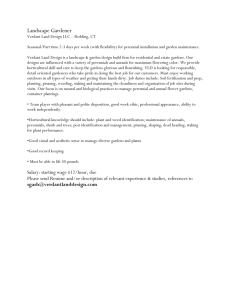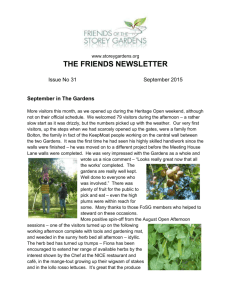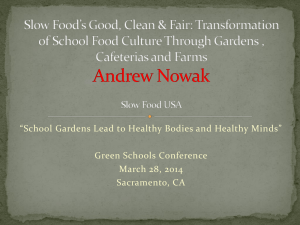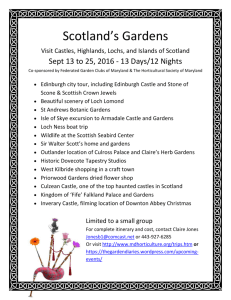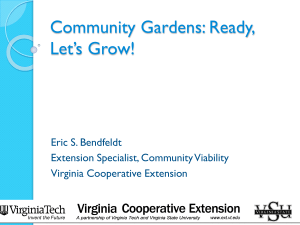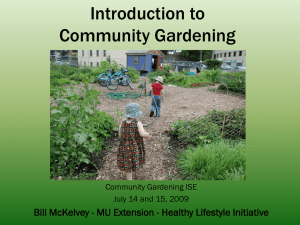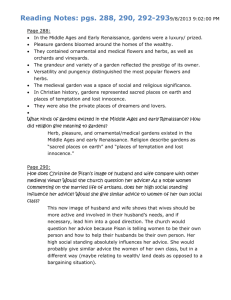Gardens Program Outline 2012 - Mountain Roots Food Project
advertisement
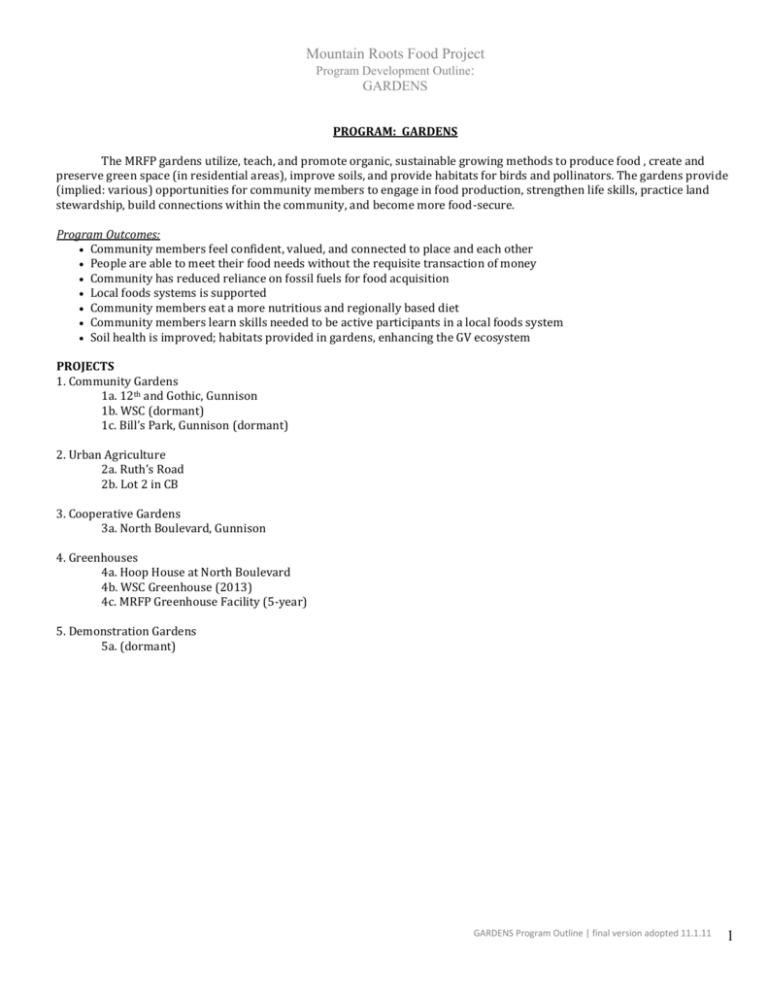
Mountain Roots Food Project Program Development Outline: GARDENS PROGRAM: GARDENS The MRFP gardens utilize, teach, and promote organic, sustainable growing methods to produce food , create and preserve green space (in residential areas), improve soils, and provide habitats for birds and pollinators. The gardens provide (implied: various) opportunities for community members to engage in food production, strengthen life skills, practice land stewardship, build connections within the community, and become more food-secure. Program Outcomes: Community members feel confident, valued, and connected to place and each other People are able to meet their food needs without the requisite transaction of money Community has reduced reliance on fossil fuels for food acquisition Local foods systems is supported Community members eat a more nutritious and regionally based diet Community members learn skills needed to be active participants in a local foods system Soil health is improved; habitats provided in gardens, enhancing the GV ecosystem PROJECTS 1. Community Gardens 1a. 12th and Gothic, Gunnison 1b. WSC (dormant) 1c. Bill’s Park, Gunnison (dormant) 2. Urban Agriculture 2a. Ruth’s Road 2b. Lot 2 in CB 3. Cooperative Gardens 3a. North Boulevard, Gunnison 4. Greenhouses 4a. Hoop House at North Boulevard 4b. WSC Greenhouse (2013) 4c. MRFP Greenhouse Facility (5-year) 5. Demonstration Gardens 5a. (dormant) GARDENS Program Outline | final version adopted 11.1.11 1 Mountain Roots Food Project Program Development Outline: GARDENS Project 1: Community Gardens Description: Community Gardens provide land for community members to grow their own food and experience the many benefits of gardening which include: production of nutritious local food, social interaction, neighborhood beautification, and connection with the land. Plots are rented on a seasonal basis, and work-trade agreements are available for those who need financial assistance. Activities: 12th & Gothic Community Garden—promote, oversee WSC Community Garden—support Bill’s Park Garden—partnership with Mountain View Apartment residents Goals/Outcomes: A. Visionary The gardens and those who participate in community gardening: - contribute to the preservation of open space, provide access to it, and create sustainable uses of the space -create recreational and therapeutic opportunities for community -promote environmental awareness -provide community education -contribute to local food system B. (3-5 year) Expand 12th & Gothic Garden by adding additional beds / plots Build community involvement by promoting plots, workshops, and events at community gardens Support City of Gunnison research and plans for developing additional property for community garden space. Effort to include or benefit low-income residents and neighbors of varying ages, races, ethnicities C. Specific (1 year): 7 of 9 plots at 12th & Gothic Garden rented by community members in 2012 (or, if under-used, lots is converted to an Urban Ag style garden) Develop partnership with the Mountain View Apartment residents in order to support use of Bill’s Park Garden by residents and community members. GARDENS Program Outline | final version adopted 11.1.11 2 Mountain Roots Food Project Program Development Outline: GARDENS Project 2: Urban Agriculture Description: The Urban Agriculture project converts unused public and private land into sustainable food production gardens that are managed and maintained collectively. Urban gardens utilize, teach, and promote organic, sustainable growing techniques, offering all residents access to local food and opportunities to strengthen life skills, build connections within the community, build valley-wide food security, improve community green spaces, foster a unique sense of place, and become citizen stewards. Activities: 2a. Ruth’s Road (1/3 acre) 2b. Plot #2 in CB Goals / Outcomes A. (Visionary) - Make access to real food more equitable while building community green spaces - Teach organic food production specific to high elevation and cool climate of Gunnison county -Create a collaborative effort between residents, municipalities, schools, and service organizations to develop more sustainable communities and support local food systems -Engage a new, more diverse conservation constituency that will sustain our unique sense of place and ethic of stewardship into the next generation. B. Long-Term Goals (3-5 year) - Engage new audiences (food bank recipients, low income residents, Hispanic residents, at-risk youth) in sustainable gardening, environmental stewardship, and garden decisions - expand crop variety to include traditional high-altitude crops - establish a plot for grain rotation - match production with distribution outlets C. Specific goals (1 year) - Continue the urban garden at Ruth’s Road (1/3 acre) - Install one additional production-based Urban Garden in CB - Engage, empower, and educate at least 10 additional community members as active participants of the Urban Gardens and coordinate volunteers more effectively - Develop a plan / proposal for an interperative / demonstration garden in partnerships with Town of CB DESIRED OUTCOMES: By teaching community members how to grow food at 8,000 feet, and offering the support, knowledge, and shared resources of our master gardeners and gardening team, we will: 1. Increase the access to and availability of local, organic foods to people of all economic groups 2. Increase the number of home gardens in the Gunnison Valley 3. Increase the amount of local, organic food grown and eaten by residents of Gunnison County 4. Raise awareness about food choices and their wider impacts, on health, environment, and economy 5. Protect groundwater and the environment from impairment or degradation due to the improper use of agricultural chemicals 6. Remove noxious weeds and introduce native plants in community green spaces 7. Provide opportunities for development of personal and social skills such as leadership, civic responsibility, community, and self-esteem 8. Promote cultural integration through horticultural education and experience GARDENS Program Outline | final version adopted 11.1.11 3 Mountain Roots Food Project Program Development Outline: GARDENS PROJECT 3 : CO-OP GARDEN Description: The cooperative gardens provide an opportunity for individuals to subscribe to a collaborative gardening experience. Co-op gardens are operated by and for a specific group of annual 'members' who contribute time, resources, and energy to the garden and, in return, are the primary beneficiaries of the garden's produce. Members commit to a share in the harvest at the beginning of each growing season, and then share in the work, benefits, and risks of a sustainable organic garden. Decisions are made collectively within the member group. Members agree to donate a percentage of food produced. Memberships in each co-op garden renew annually. Activities: North Boulevard, Gunnison Goals / Outcomes A. Visionary goals/outcomes (3-5 years): - Community members from a diversity of ethnicities, economic classes, and ages work together in the garden - The gardens are a demonstration site for ecological gardening practices and proactive community building - Food produced from the garden improves the quality of member's lives by reducing the amount of money spent on groceries and by providing healthy food for their families B. Specific goals/outcomes (1 year): - The N. Boulevard gardens engage 10 members in the 2012 growing season - The successes and failures of the 2012 season are documented to serve as a guide for expanding the program in future years . Project 4: GREENHOUSES Description: The Greenhouses project will provide season extension by producing garden starts and by accommodating late crops in the fall. The greenhouses will serve all of the gardens directly by providing starts, and will also serve the education programs by providing a place to learn about season extension and appropriate growing facilities for our climate. Activities in 2012: Hoop House at North Boulevard Goals/ Outcomes: A. Visionary Goals / Outcomes: -Season extension capabilities in every MRFP garden -Year round food production facility -Partnership with Western State College greenhouse facilities B. Specific Goals (1 year) -Build a hoop-house at the N. Boulevard garden and operate for starts for all MR gardens, summer growing, and season extension -Develop a plan, research locations, and seek funding for an earth sheltered greenhouse (or similar structure) -Create a partnership and management plan with WSC Student Life for the WSC Greenhouse as soon as construction is complete, projected for Aug. 2012 GARDENS Program Outline | final version adopted 11.1.11 4 Mountain Roots Food Project Program Development Outline: GARDENS PROJECT 5: DEMONSTRATION GARDENS The MRFP Demonstration Gardens serve as sites where a variety of growing methods are actively managed and practiced. The primary function of these sites is to demonstrate organic growing techniques that may be specific to climate, space, soil condition, or cultural or historic tradition. The sites provide an interpretive, self-guided, comparative study and informative demonstrations for the general public, and enable community members to observe and practice different methods that can be replicated by individuals. Activities: (dormant) Goals / Outcomes: -demonstrate a variety of growing techniques, styles, methods -provide a visible, public demonstration of gardening to inspire and educate the general public -provide interpretive signage to enable self-guided ‘tours’ of demonstration gardens -provide a space for workshops and classes to observe and/ or participate in a variety of growing methods GARDENS Program Outline | final version adopted 11.1.11 5
